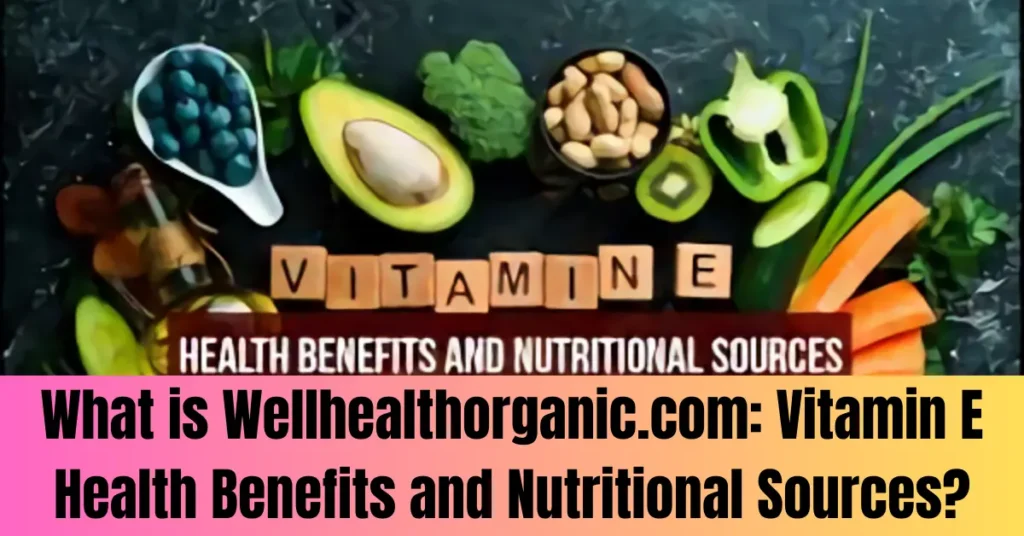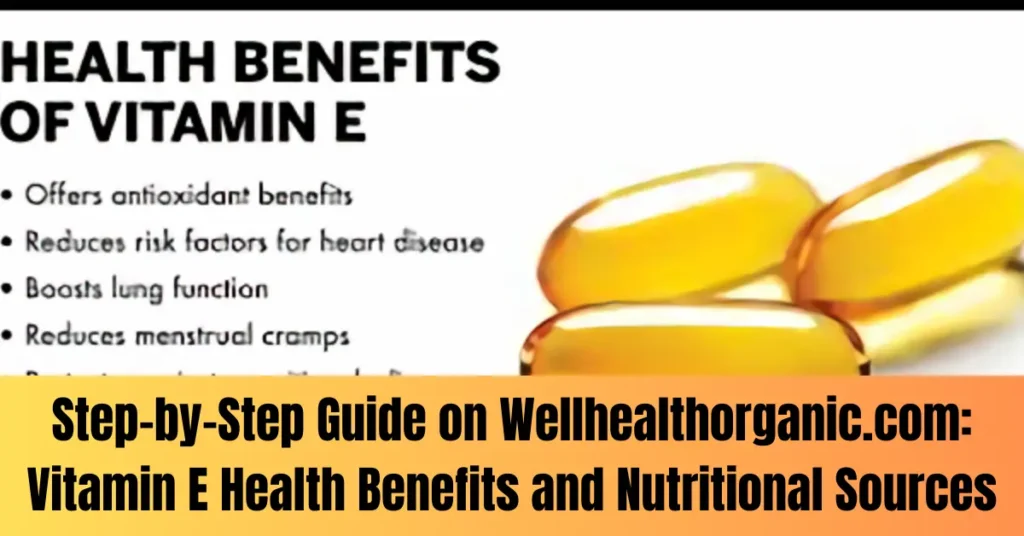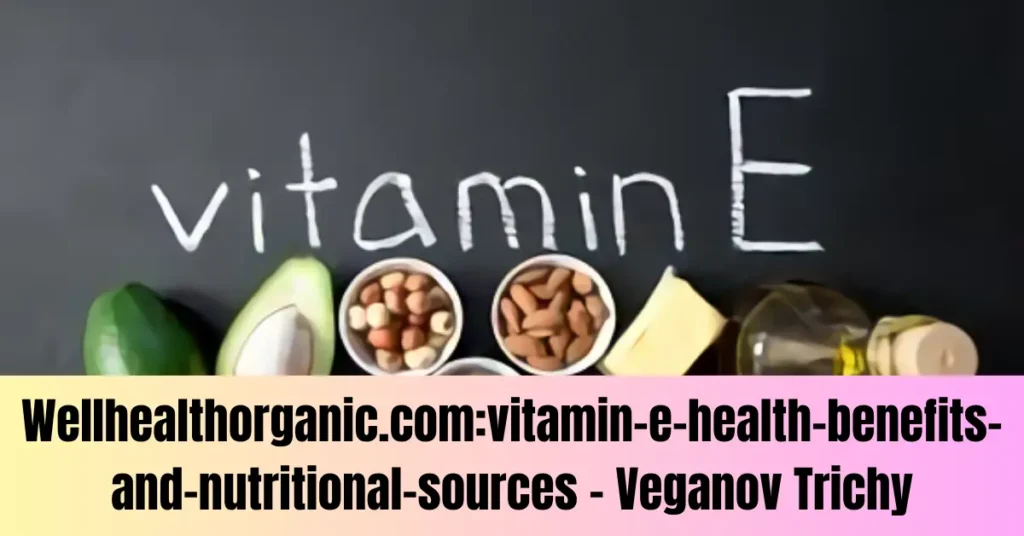Introduction
Welcome to our blog on Wellhealthorganic.com:vitamin-e-health-benefits-and-nutritional-sources! Today, we’re diving into the fascinating world of vitamin E, a powerhouse nutrient that often doesn’t get the attention it deserves. At Wellhealthorganic.com, we believe in the incredible benefits that vitamin E offers for your health and wellness.
From boosting your immune system to keeping your skin looking youthful, vitamin E plays a crucial role in maintaining overall well-being. In this article, we’ll explore the various health benefits of vitamin E and identify some of the best nutritional sources to include in your diet. Let’s get started on how you can harness the power of vitamin E for a healthier, happier you!
What is Wellhealthorganic.com: Vitamin E Health Benefits and Nutritional Sources?

- Wellhealthorganic.com is a trusted resource dedicated to providing valuable information on various health topics, including the amazing benefits of vitamin E.
- In our article “Wellhealthorganic.com: Vitamin E Health Benefits and Nutritional Sources,” we aim to shed light on why vitamin E is essential for your health and how you can easily incorporate it into your daily routine.
- Vitamin E is a fat-soluble antioxidant that helps protect your cells from damage caused by free radicals, which can lead to chronic diseases.
- It also plays a vital role in supporting your immune system, maintaining healthy skin, and promoting good eye health.
- Through this article, we will guide you through the health benefits of vitamin E and highlight some of the best dietary sources to ensure you’re getting enough of this essential nutrient.
- Whether you’re looking to enhance your diet or simply learn more about vitamin E, you’re in the right place!
You May Also Like It
Instagram Par Follower Kaise Badhaye With Can Follow Website – Veganov Trichy
1000+ Free Instagram Story Views In 2024 – Veganov Trichy
How To Increase Followers On Instagram With TakipciGir New Update 2024
Why is Wellhealthorganic.com: Vitamin E Health Benefits and Nutritional Sources Important?
Understanding the health benefits and nutritional sources of vitamin E is crucial for maintaining optimal well-being. Here’s why this topic is so important:
Boosts Immune System Function
- Protects Against Infections: Vitamin E enhances the immune system’s ability to fight off infections and illnesses.
- Supports Immune Cells: It helps in the production and function of immune cells, which are essential for a healthy immune response.
Promotes Healthy Skin
- Antioxidant Protection: Vitamin E neutralizes free radicals that can cause skin damage and aging.
- Moisturizes and Repairs: It helps in maintaining skin hydration and repairing damaged skin cells, contributing to a more youthful appearance.
Supports Eye Health
- Prevents Eye Diseases: Vitamin E has been shown to reduce the risk of age-related macular degeneration and cataracts.
- Protects Retinal Health: It helps in maintaining the health of the retina, crucial for good vision.
Contributes to Cardiovascular Health
- Reduces Oxidative Stress: By reducing oxidative stress, vitamin E helps in preventing the buildup of harmful cholesterol in the arteries.
- Supports Heart Health: It may contribute to a lower risk of heart disease by improving overall cardiovascular function.
Enhances Overall Cellular Health
- Cell Protection: Vitamin E protects cell membranes from damage, which is vital for overall cellular health and function.
- Aids in Cellular Repair: It plays a role in repairing damaged cells, which is essential for recovery and health maintenance.
Step-by-Step Guide on Wellhealthorganic.com: Vitamin E Health Benefits and Nutritional Sources

Looking to make the most of vitamin E’s health benefits? Follow this step-by-step guide to understand how vitamin E can enhance your well-being and how to incorporate it into your diet.
Step 1: Understand Vitamin E and Its Benefits
Learn About Vitamin E
- Definition: Vitamin E is a fat-soluble antioxidant essential for protecting cells from damage.
- Health Benefits: It supports immune function, skin health, eye health, cardiovascular health, and overall cellular health.
Recognize Its Importance
- Immune System: Helps in fighting infections.
- Skin Health: Provides protection against skin aging and damage.
- Eye Health: Reduces the risk of eye diseases.
- Cardiovascular Health: Contributes to heart health by reducing oxidative stress.
- Cellular Health: Aids in cell repair and protection.
Step 2: Identify Nutritional Sources of Vitamin E
Dietary Sources
- Nuts and Seeds: Almonds, sunflower seeds, and hazelnuts.
- Vegetable Oils: Sunflower oil, safflower oil, and olive oil.
- Leafy Greens: Spinach and kale.
- Fortified Foods: Some cereals and juices are fortified with vitamin E.
Consider Supplements (if necessary)
- Consult a Healthcare Provider: Before starting any supplements, speak with a healthcare professional to determine if you need additional vitamin E.
- Choose Quality Supplements: Look for reputable brands and follow dosage recommendations.
Step 3: Incorporate Vitamin E into Your Daily Diet
Plan Your Meals
- Breakfast: Add nuts or seeds to your morning smoothie or cereal.
- Lunch: Include a salad with spinach and sunflower seeds.
- Dinner: Use vegetable oils in cooking or prepare dishes with leafy greens.
Healthy Snacks
- Nutrient-Rich Choices: Snack on almonds or a handful of sunflower seeds.
Check Food Labels
- Fortified Options: Opt for foods that are fortified with vitamin E, especially if your diet lacks natural sources.
Step 4: Monitor and Adjust Your Intake
Track Your Consumption
- Keep a Food Diary: Record your daily intake of vitamin E-rich foods and supplements.
- Assess Your Needs: Adjust your diet based on your health goals and dietary requirements.
Seek Professional Advice
- Regular Check-ups: Consult with a healthcare provider to ensure you’re meeting your vitamin E needs and making the best choices for your health.
Advantages
Boosts Immune System Function
- Advantage: Enhances the body’s ability to fight infections and supports overall immune health.
Promotes Healthy Skin
- Advantage: Acts as an antioxidant that protects skin cells from damage, helps in reducing signs of aging, and improves skin hydration.
Supports Eye Health
- Advantage: May lower the risk of age-related eye diseases such as macular degeneration and cataracts, contributing to better vision.
Contributes to Cardiovascular Health
- Advantage: Helps reduce oxidative stress and the risk of heart disease by improving cardiovascular health.
Enhances Cellular Health
- Advantage: Protects and repairs cells, supporting overall cellular function and health.
Versatile Dietary Sources
- Advantage: Found in various foods like nuts, seeds, and leafy greens, making it relatively easy to incorporate into your diet.
Disadvantages
Risk of Overconsumption
- Disadvantage: Excessive intake, especially from supplements, can lead to toxicity, causing symptoms such as nausea, diarrhea, and increased bleeding risk.
Interactions with Medications
- Disadvantage: High doses of vitamin E can interact with blood-thinning medications and other drugs, potentially leading to complications.
Limited Absorption from Certain Foods
- Disadvantage: Some foods might not provide a sufficient amount of vitamin E, especially if they are processed or not fresh.
Potential for Imbalance
- Disadvantage: Overemphasis on vitamin E might lead to neglecting other essential nutrients that are equally important for overall health.
Cost of Supplements
- Disadvantage: High-quality vitamin E supplements can be expensive, and their benefits might not justify the cost if dietary sources are adequate.
Possible Side Effects
- Disadvantage: Some individuals may experience allergic reactions or gastrointestinal issues from vitamin E supplements.
What is Vitamin E and why is it important?
What are the best sources of Vitamin E in my diet?
How much Vitamin E do I need each day?
Can I get too much Vitamin E?
Are there any side effects of taking Vitamin E supplements?
How can I tell if I’m getting enough Vitamin E?
Can Vitamin E help with skin problems?
Conclusion
Vitamin E is a valuable nutrient that offers numerous health benefits, from boosting your immune system to supporting healthy skin and eyes. By including vitamin E-rich foods like nuts, seeds, and leafy greens in your diet, you can enjoy its positive effects on your overall well-being.
Just remember, balance is key—getting too much vitamin E, especially from supplements, can cause issues. If you’re unsure about your vitamin E needs, a quick chat with your healthcare provider can help you make the best choices for your health. Embrace the power of vitamin E and take steps towards a healthier you!
Bonus Points on Wellhealthorganic.com: Vitamin E Health Benefits and Nutritional Sources
Here are some additional tips to maximize the benefits of vitamin E and enhance your overall health:
Combine with Vitamin C
- Tip: Pairing vitamin E with vitamin C can boost their antioxidant effects. For example, enjoy a snack of almonds (vitamin E) with a glass of orange juice (vitamin C).
Choose Fresh and Natural Sources
- Tip: Opt for fresh, whole foods over processed ones. Fresh nuts, seeds, and leafy greens are often richer in nutrients and free from additives.
Store Foods Properly
- Tip: Vitamin E can be sensitive to heat and light. Store nuts and oils in cool, dark places to preserve their nutrient content.
Use Vitamin E-Rich Oils in Cooking
- Tip: Incorporate vitamin E-rich oils like sunflower or safflower oil in your cooking for added health benefits.
Check Your Supplement Labels
- Tip: If you take supplements, choose ones that provide the natural form of vitamin E (d-alpha-tocopherol) rather than synthetic forms.
Monitor Your Overall Diet
- Tip: A balanced diet with a variety of nutrients is crucial. Ensure you’re also getting other vitamins and minerals to support overall health.
Consider Fortified Foods
- Tip: Look for foods fortified with vitamin E if you find it challenging to meet your needs through diet alone.
Stay Hydrated
- Tip: Drinking plenty of water helps with the absorption of fat-soluble vitamins like vitamin E, so keep hydrated throughout the day.
Regular Check-Ups
- Tip: Regular health check-ups can help monitor your vitamin E levels and overall nutritional status, allowing for timely adjustments to your diet or supplements.
You May Also Like It
Trendzguruji.me – Computer, Cyber, Awareness, SEO, Health & Beauty Guide
TrendzGuruji.me Cyber Insights Hub
“What’s Up with Emerald Gems? Let’s Talk”
